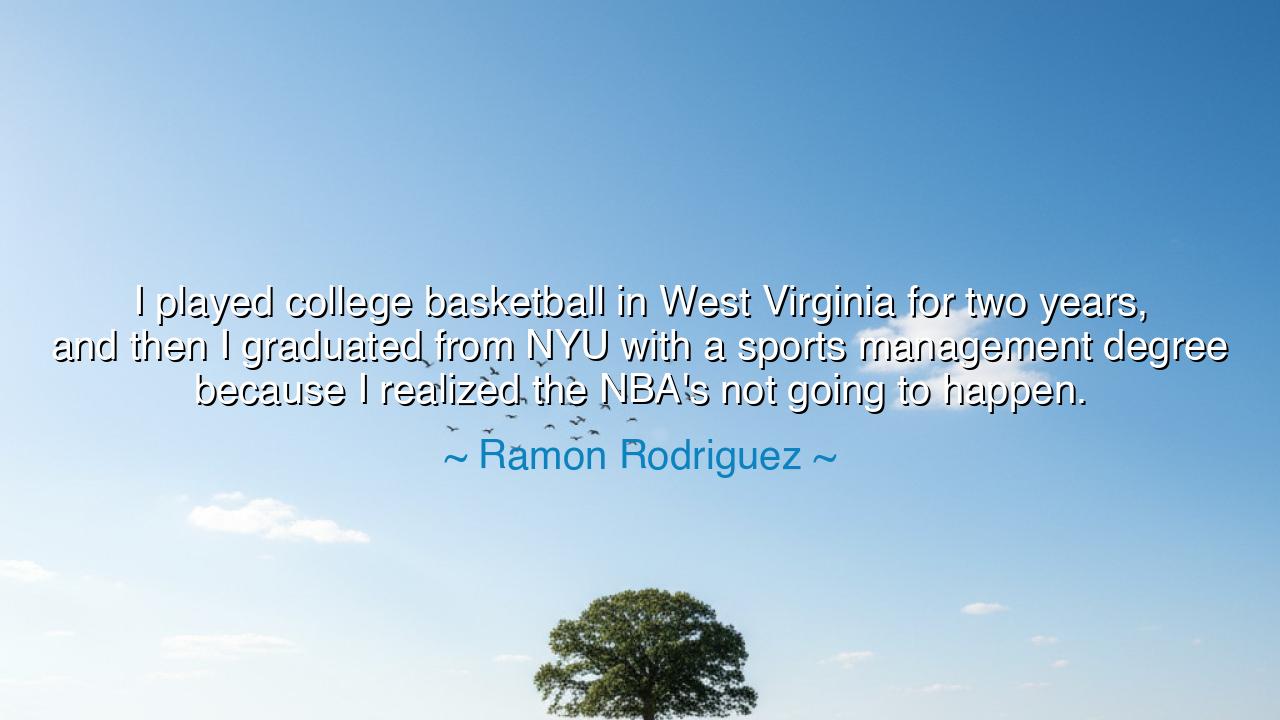
I played college basketball in West Virginia for two years, and
I played college basketball in West Virginia for two years, and then I graduated from NYU with a sports management degree because I realized the NBA's not going to happen.






When Ramon Rodriguez confessed, “I played college basketball in West Virginia for two years, and then I graduated from NYU with a sports management degree because I realized the NBA’s not going to happen,” he revealed not a tale of defeat, but a story of wisdom, humility, and transformation. His words strike at the heart of a universal truth: that the dreams of youth, though noble, sometimes yield to the reality of life’s greater path. Yet in this yielding, there is not shame, but strength—for to change course with dignity is itself an act of courage.
The ancients revered such wisdom. They knew that destiny does not always carry us to the battlefield or the throne we once imagined. Often, the gods guide us toward a different calling, one we had not foreseen. Rodriguez’s shift from the pursuit of college basketball to the study of sports management reflects this ancient rhythm: the recognition that while one door may close, another opens, leading not to ruin but to a different form of greatness.
To play basketball in West Virginia, to give two years of sweat and striving, was itself no small feat. He stood among the few who rise to the level of collegiate competition, where talent must be honed by relentless discipline. Yet in his words, “the NBA’s not going to happen,” we hear not bitterness, but acceptance. This humility is heroic, for many souls cling blindly to dreams long after they have faded, wasting years in pursuit of what will never come. Rodriguez chose instead to pivot, to transform his passion into a career of a different kind.
History gives us an echo in the story of Marcus Aurelius, the Roman emperor. Though trained as a philosopher, he was called to rule. He might have lamented that his dream of quiet study was lost, but instead he merged philosophy with leadership, becoming known as the philosopher-king. He shows us, as Rodriguez does, that the true hero does not insist upon the form of his destiny, but embraces the path life places before him. What matters is not the stage upon which we act, but the spirit with which we act upon it.
Rodriguez’s choice of sports management is also telling. He did not abandon his love of sport, nor turn away from the world that shaped him. Instead, he found a way to serve the same field from a different position. This is a mark of wisdom: to adapt one’s dream rather than discard it, to find new ways to live one’s passion even when the old path is blocked. It is as though the warrior who can no longer ride into battle takes up the role of strategist, still shaping the field of war but through different means.
The lesson here is powerful: do not measure your life only by whether your first dream is fulfilled. Dreams shift, evolve, and mature. What begins as ambition for glory may transform into a calling for guidance, leadership, or service. To recognize this is not failure—it is growth. The seed does not betray itself when it becomes a tree; it fulfills its purpose in another form.
Practically, this means we must be honest with ourselves about our gifts, our limits, and the opportunities before us. Pursue your passion with all your strength, but when life shows you another path, do not resist it in bitterness. Instead, ask how your love, your discipline, your skills may serve in a new way. Embrace the pivot, for it may lead you to a destiny greater than the one you first imagined.
Thus, Ramon Rodriguez’s words stand as an enduring reminder: to accept, to adapt, and to grow is the true measure of strength. Whether on the court or in the halls of management, what matters is not the title of champion, but the courage to keep shaping one’s life with purpose. For those who live with such wisdom, the NBA—or any lost dream—is not the end of the story, but the beginning of another, just as noble and just as enduring.






AAdministratorAdministrator
Welcome, honored guests. Please leave a comment, we will respond soon